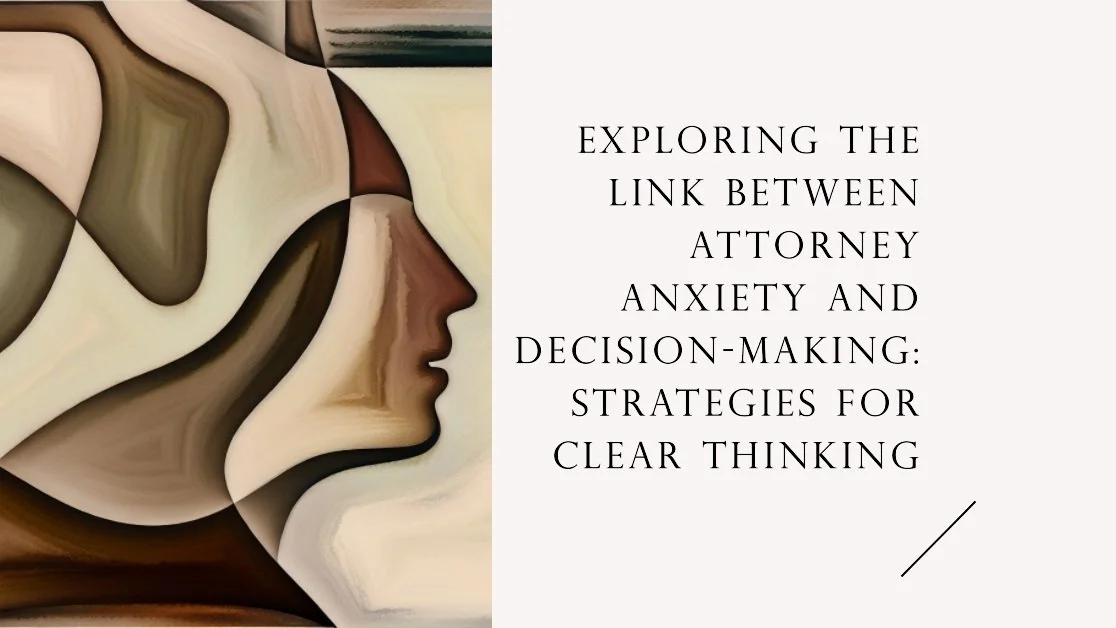Exploring the Link Between Attorney Anxiety and Decision-Making: Strategies for Clear Thinking
In the high-stakes, high-pressure world of law, attorneys are no strangers to stress and anxiety. These feelings, while common, can have a significant impact on various aspects of their work, including one of the most critical elements of legal practice: decision-making. Understanding the link between attorney anxiety and decision-making is not just beneficial—it's crucial for maintaining effective legal practice.
The Impact of Anxiety on Decision-Making
Anxiety, by its very nature, can significantly affect our decision-making processes. It can cause us to overestimate risks, rush decisions, or in some cases, avoid making decisions altogether. For attorneys, whose work often involves making high-stakes decisions under pressure, the impact of anxiety can be particularly profound.
When anxiety takes hold, it can lead to less effective strategies, missed opportunities, and decreased client satisfaction. It can also contribute to a vicious cycle, where anxiety leads to poor decision-making, which leads to more anxiety.
Strategies for Clear Thinking
Fortunately, there are several strategies attorneys can use to manage anxiety and enhance clear thinking:
Mindfulness and Meditation: These practices can help attorneys stay present and focused, reducing anxiety and improving decision-making. Regular mindfulness exercises, such as deep breathing, progressive muscle relaxation, or guided meditations, can help attorneys recognize and manage their anxiety, leading to clearer thinking.
Physical Activity: Regular exercise is a powerful tool for reducing anxiety and improving cognitive function. Whether it's a morning jog, a lunchtime yoga class, or an after-work gym session, physical activity can help clear the mind and improve decision-making. Even a short walk around the block can provide a much-needed break and help reset the mind.
Healthy Sleep Habits: Adequate sleep is crucial for cognitive functions, including decision-making. Attorneys should prioritize good sleep hygiene to ensure they are well-rested and ready to make important decisions. This includes maintaining a regular sleep schedule, creating a restful environment, and avoiding caffeine and electronic devices before bed.
Balanced Nutrition: What we eat can also impact our mental health and cognitive function. A balanced diet rich in fruits, vegetables, lean proteins, and whole grains can provide the nutrients necessary for brain health. Additionally, staying hydrated and avoiding excessive caffeine and alcohol can help manage anxiety levels.
Professional Support: If anxiety is significantly impacting an attorney's ability to make decisions, they may benefit from professional support. Therapists and counselors can provide strategies and techniques to manage anxiety. Cognitive-behavioral therapy (CBT), in particular, can be effective in helping individuals understand and change thought patterns that lead to anxiety and problematic behaviors.
Creating a Supportive Work Environment: Law firms can also play a role in supporting attorneys with anxiety. This can include providing resources for mental health, fostering a supportive and understanding culture, and reducing unnecessary stressors. Firms can offer workshops or training sessions on stress management, encourage work-life balance, and ensure workloads are reasonable.
The Future of Decision-Making in Law
As the legal profession continues to grapple with issues of stress and anxiety, understanding the impact of these feelings on decision-making is crucial. By implementing strategies to manage anxiety and support clear thinking, attorneys can improve their decision-making abilities and provide better service to their clients.
In the future, we can expect to see more emphasis on mental health in the legal profession. Law firms may begin to incorporate mental health strategies into their training programs, and law schools may start to address these issues in their curriculums. Additionally, as the stigma around mental health continues to decrease, more attorneys may feel comfortable seeking help when they need it.
Anxiety is a common issue in the legal profession, and its impact on decision-making cannot be underestimated. However, by understanding this relationship and implementing strategies to manage anxiety, attorneys can enhance their decision-making abilities, improve their professional performance, and maintain their mental well-being.
Remember, while this post provides strategies for managing anxiety, it does not replace professional help. If you're struggling with anxiety, please seek the support of a mental health professional. It's important to take care of your mental health, not just for your professional success, but for your overall well-being.

